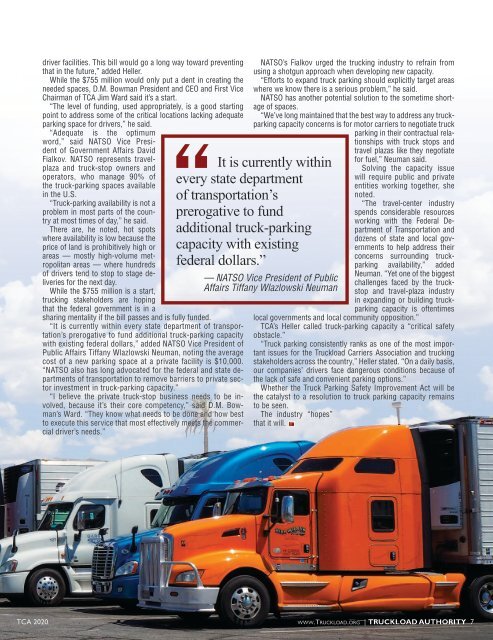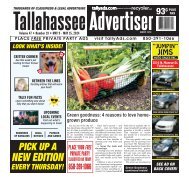TLA42_AllPages
Create successful ePaper yourself
Turn your PDF publications into a flip-book with our unique Google optimized e-Paper software.
driver facilities. This bill would go a long way toward preventing<br />
that in the future,” added Heller.<br />
While the $755 million would only put a dent in creating the<br />
needed spaces, D.M. Bowman President and CEO and First Vice<br />
Chairman of TCA Jim Ward said it’s a start.<br />
“The level of funding, used appropriately, is a good starting<br />
point to address some of the critical locations lacking adequate<br />
parking space for drivers,” he said.<br />
“Adequate is the optimum<br />
word,” said NATSO Vice President<br />
of Government Affairs David<br />
“<br />
Fialkov. NATSO represents travelplaza<br />
and truck-stop owners and<br />
operators, who manage 90% of<br />
the truck-parking spaces available<br />
in the U.S.<br />
“Truck-parking availability is not a<br />
problem in most parts of the country<br />
at most times of day,” he said.<br />
There are, he noted, hot spots<br />
where availability is low because the<br />
price of land is prohibitively high or<br />
areas — mostly high-volume metropolitan<br />
areas — where hundreds<br />
of drivers tend to stop to stage deliveries<br />
for the next day.<br />
While the $755 million is a start,<br />
trucking stakeholders are hoping<br />
that the federal government is in a<br />
sharing mentality if the bill passes and is fully funded.<br />
“It is currently within every state department of transportation’s<br />
prerogative to fund additional truck-parking capacity<br />
with existing federal dollars,” added NATSO Vice President of<br />
Public Affairs Tiffany Wlazlowski Neuman, noting the average<br />
cost of a new parking space at a private facility is $10,000.<br />
“NATSO also has long advocated for the federal and state departments<br />
of transportation to remove barriers to private sector<br />
investment in truck-parking capacity.”<br />
“I believe the private truck-stop business needs to be involved,<br />
because it’s their core competency,” said D.M. Bowman’s<br />
Ward. “They know what needs to be done and how best<br />
to execute this service that most effectively meets the commercial<br />
driver’s needs.”<br />
NATSO’s Fialkov urged the trucking industry to refrain from<br />
using a shotgun approach when developing new capacity.<br />
“Efforts to expand truck parking should explicitly target areas<br />
where we know there is a serious problem,” he said.<br />
NATSO has another potential solution to the sometime shortage<br />
of spaces.<br />
“We’ve long maintained that the best way to address any truckparking<br />
capacity concerns is for motor carriers to negotiate truck<br />
parking in their contractual relationships<br />
with truck stops and<br />
travel plazas like they negotiate<br />
It is currently within<br />
every state department<br />
of transportation’s<br />
prerogative to fund<br />
additional truck-parking<br />
capacity with existing<br />
federal dollars.”<br />
for fuel,” Neuman said.<br />
Solving the capacity issue<br />
will require public and private<br />
entities working together, she<br />
noted.<br />
“The travel-center industry<br />
spends considerable resources<br />
working with the Federal Department<br />
of Transportation and<br />
dozens of state and local governments<br />
to help address their<br />
concerns surrounding truckparking<br />
availability,” added<br />
Neuman. “Yet one of the biggest<br />
challenges faced by the truckstop<br />
and travel-plaza industry<br />
in expanding or building truckparking<br />
capacity is oftentimes<br />
local governments and local community opposition.”<br />
TCA’s Heller called truck-parking capacity a “critical safety<br />
obstacle.”<br />
“Truck parking consistently ranks as one of the most important<br />
issues for the Truckload Carriers Association and trucking<br />
stakeholders across the country,” Heller stated. “On a daily basis,<br />
our companies’ drivers face dangerous conditions because of<br />
the lack of safe and convenient parking options.”<br />
Whether the Truck Parking Safety Improvement Act will be<br />
the catalyst to a resolution to truck parking capacity remains<br />
to be seen.<br />
The industry “hopes”<br />
that it will.<br />
— NATSO Vice President of Public<br />
Affairs Tiffany Wlazlowski Neuman<br />
TCA 2020 www.Truckload.org | TRUCKLOAD AUTHORITY 7

















